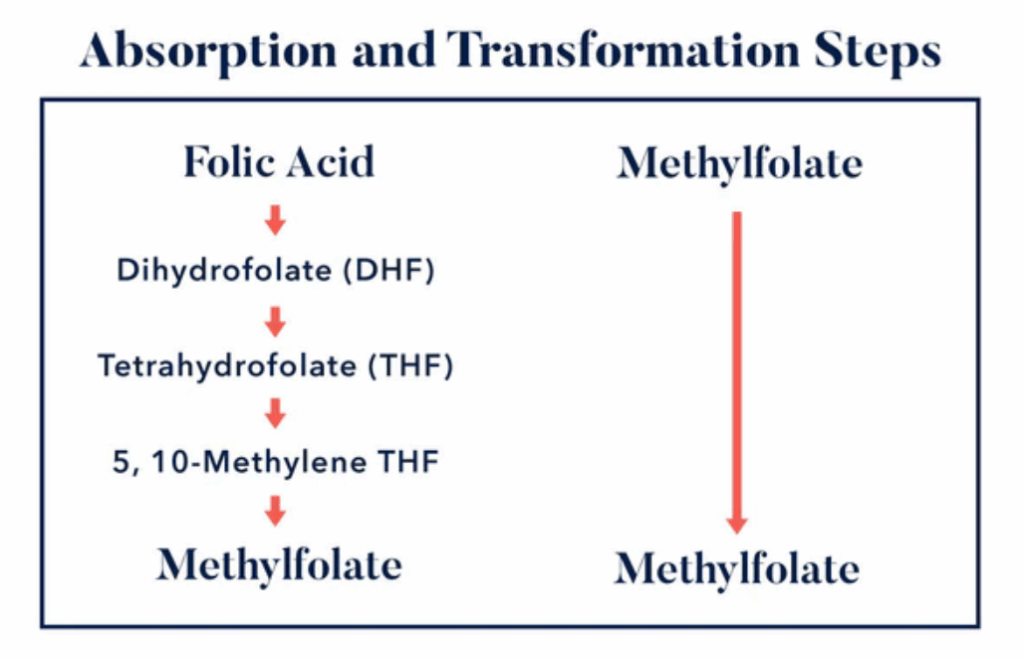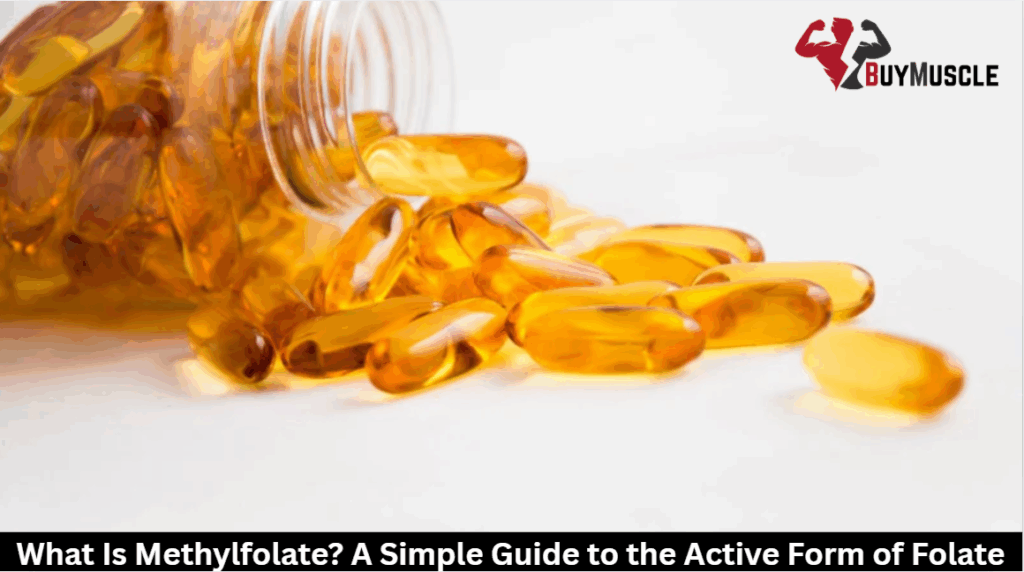You’ve probably heard about folate or folic acid, but methylfolate might be new to your nutritional vocabulary. Unlike its counterparts, methylfolate is the active, ready-to-use form of vitamin B9 that your body doesn’t need to convert. This distinction makes it an essential nutrient for many people, especially those with certain genetic variations.
Understanding the difference could explain why some supplements work better than others for you, and why your energy levels and mood might fluctuate despite a seemingly healthy diet.
What Is Methylfolate?
Methylfolate, the active superhero of the B9 vitamin family, stands out from other folate forms because your body can use it immediately. Unlike synthetic folic acid, which requires a multi-step conversion process in your liver and other tissues, methylfolate (also called 5-MTHF) is already in its bioavailable form.
This distinction is particularly important if you have an MTHFR gene mutation, which affects roughly 30-40% of the population. This genetic variation can slow down folate metabolism, making it difficult for your body to convert folic acid into usable methylfolate.
As the biologically active form of folate, methylfolate bypasses these conversion challenges, supporting critical functions like DNA synthesis, cell division, and neurotransmitter production. Your body’s systems recognize and utilize it efficiently without additional processing.

What’s the Difference Between Methylfolate vs Folic Acid
How do these two B vitamin forms differ in your body? Both provide vitamin B9 but have very different processing paths. The synthetic folic acid has several conversion steps through your liver and other tissues before it is usable. It is inefficient for many people, especially those with MTHFR gene variants.
Methylfolate is already in the active form. It is ready for immediate folate absorption. That means your body can directly use this methylated folate for DNA synthesis and cell division.
The difference between folic acid and methylfolate is particularly important during pregnancy or when addressing health concerns. Your body requires no enzymatic conversion with methylfolate, making it the preferred option for those with absorption or conversion difficulties.

How Methylfolate Works in the Body
Inside your body, this active form of folate is an important biochemical catalyst in dozens of cellular processes. Its role is mainly supporting methylation. The process also regulates homocysteine levels in your blood. Homocysteine regulation fails, and your cardiovascular risk increases.
Methylfolate requires no conversion steps because it is a bioavailable form of folate. It is therefore immediately available for DNA synthesis and repair.
Many healthcare providers now recommend methylfolate for depression treatment as it produces neurotransmitters serotonin, dopamine, and norepinephrine. They control mood, sleep, and cognitive function. Unlike synthetic folic acid, active folate crosses the blood-brain barrier efficiently, supporting peak neurological health.
Who Might Benefit from Methylfolate Supplements?
Understanding who needs methylfolate supplementation follows naturally from knowing how it works in your body. You’re likely to benefit from a 5-MTHF supplement if you have an MTHFR gene variant that impairs folate metabolism. This genetic difference affects up to 40% of people and limits their ability to convert traditional folic acid.
Pregnant women often require methylfolate to support proper neural development in their babies, reducing the risks of congenital disabilities. Those with mood disorders, chronic fatigue, or autoimmune conditions may also see improvements with proper methylfolate dosage.
Having folate-rich foods like leafy greens, legumes, and liver is the ideal way to meet your needs. However, supplements can help fill in important gaps, especially if you’re on medications that reduce folate levels or have digestive issues that interfere with absorption.

Common Signs of Folate Deficiency
Folate deficiency strikes quietly, sometimes as symptoms of everyday stress. Persistent fatigue that doesn’t improve with rest, unexplained irritability, or foggy thinking may indicate that your body needs more methylfolate.
Physical signs include a weaker immune system and frequent infections. You may experience pallor, slurred breath, or heart palpitations.
Your doctor can confirm deficiency through blood tests, especially homocysteine levels, which rise when folate is insufficient. Being able to catch these symptoms early allows intervention via diet changes or methylfolate supplementation with medical guidance.
Selecting and Using Methylfolate Supplements
Picking the right methylfolate supplement really does matter. Look for one that clearly says “5 MTHF” or “L methylfolate” on the label. Try to avoid products that just list folate or folic acid without explaining the type.
For general wellness, many people start with around 400 micrograms, while some use higher doses like 15 milligrams for specific health needs. It’s smart to begin with a lower amount and slowly work your way up to avoid things like headaches or feeling irritable.
If you’re pregnant, taking medications, or dealing with any health conditions, it’s a good idea to check with your doctor first. They can help figure out the best dose for you and make sure it’s working the way it should.
Frequently Asked Questions
Can Methylfolate Interact With Other Medications or Supplements?
Yes, methylfolate can interact with anti-seizure medications, methotrexate, and some antibiotics. Tell your doctor about all supplements you’re taking to avoid potential interactions with your medications.
When Will The Effects of Methylfolate Start?
Results from methylfolate vary widely. You’ll likely notice energy improvements within days, while mood benefits can take 2-4 weeks. Neurological effects may require 1-3 months of consistent supplementation for noticeable changes.
Are There Any Side Effects of Taking Methylfolate?
You may experience mild side effects like headaches, nausea, irritability, sleep changes, or anxiety. These side effects usually fade as your body adapts, but it’s best to begin with a lower dose and check with your healthcare provider if you have any concerns.
Can Children Safely Take Methylfolate Supplements?
Children can safely take methylfolate supplements, but you’ll need a pediatrician’s guidance for proper dosing. Kids should only take it with certain genetic variants or deficiencies rather than as a routine supplement.
Should Methylfolate Be Taken With Food or on an Empty Stomach?
You can take methylfolate with or without food. While it’s typically well-absorbed either way, taking it with meals may help reduce potential stomach discomfort that some people experience with supplements.







